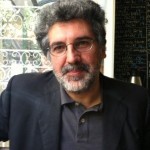Ayça Çubukçu (a.cubukcu@lse.ac.uk)

Ayça Çubukçu is Assistant Professor in Human Rights in the Department of Sociology and the Centre for the Study of Human Rights at London School of Economics and Political Science. She will be a Visiting Fellow of the Committee on Globalization and Social Change, the Graduate Center, CUNY during Fall 2014. Before LSE, Dr. Çubukçu taught for the Committee on Global Thought at Columbia University and the Committee on Degrees in Social Studies at Harvard University. During the 2009-2010 academic year, she was a Max Weber Fellow at the European University Institute. A transdisciplinary scholar by training, Dr. Çubukçu holds a BA in Government with Distinction in All Subjects from Cornell University and a PhD with Distinction from the Department of Anthropology at Columbia University.
Aarthi Vadde (aarthi.vadde@duke.edu)
Aarthi Vadde is Assistant Professor of English and International Comparative Studies at Duke University. She works in the overlapping fields of British and Anglophone literature with a particular interest in the novel, transnational modernism, postcolonialism, and contemporary issues of migration and globalization. Her current book project, entitled “Chimeras of Form: Modernist Internationalism from the Late Colonial to Contemporary Era” looks at the conjuncture of modernist aesthetics and internationalism in the first half of the twentieth century. From there, it recovers a set of formal strategies and political aspirations that remain crucial for writers adapting the novel to the contemporary moment of globalization. Tracing convergences between formal experimentation and global thought in works that circulate across Britain, South Asia, and the Caribbean, this study diversifies the practices and practitioners usually associated with modernism’s evolution and its legacies. Scholarly articles have appeared (or are forthcoming) in such venues as NOVEL, Comparative Literature, Public Books, Modern Fiction Studies, Ariel, and The Cambridge Companion to British Literature after 1945. Vadde joined Duke from a postdoctoral fellowship in the English Department at Harvard and currently serves as book reviews editor (British and Anglophone literature division) for the journal Contemporary Literature.
Kaysha Corinealdi (kaysha.corinealdi@aya.yale.edu)
Kaysha Corinealdi is an historian of twentieth century Latin America and the United States with a focus on race and ethnicity formation, nationalism and migration. She is currently a Lecturer at Columbia University and during the 2013-2014 academic year was a Visiting Scholar at New York University’s Center for Latin American and Caribbean Studies. As a Visiting Fellow at the CGSC she will be working on her book project “The Afterlives of the Canal: Black Diasporic Activism in Cold War Panama and the United States,” which focuses on the development of a vocal Afro-diasporic community in Panama and the United States from the 1940s to the 1980s. The book traces the activism of this community to anti-colonial struggles, civil rights debates, anti-militarization campaigns, and migrant activism, all of which increasingly questioned the Cold War tools and promises of democracy and equality. Corinealdi received her PhD in History from Yale University.
Massimiliano Tomba (massimiliano.tomba@unipd.it)
Massimiliano Tomba’s research interests concern modern political philosophy, with a particular emphasis on German classical philosophy, modern and contemporary political thought, critical theory (especially the Frankfurt School), and theories of the modern state. His work has involved theorists such as Kant, Hegel and post-Hegelian thought, Marx, Walter Benjamin, and Theodor Adorno. His current research and teaching focuses on the history of political thought and the themes of human rights, globalization, and the reconfiguration of time and space in a global horizon. His work has recently been directed toward the re-consideration of the Eurocentric paradigm that has for a long time structured analyses and interventions in discourses of human rights and globalization. He is interested in studying difference (social, cultural, economic, and political) within the context of a “plurality of temporalities” in relation and conflict with each other instead of the Eurocentric framework of progress within which difference is generally examined. This move, inspired by insights from postcolonial scholarship and building on my previous work on temporalities in Marx’s thought, enables him to provide a critique of our habitual categorical schemes of interpretation.


